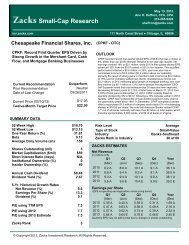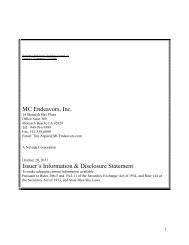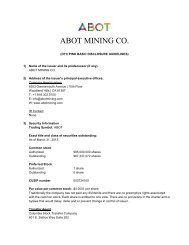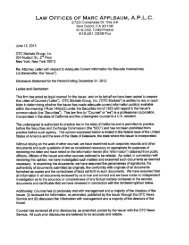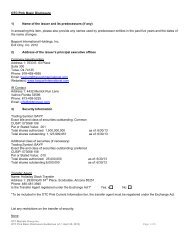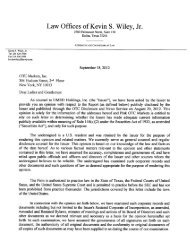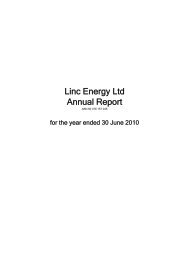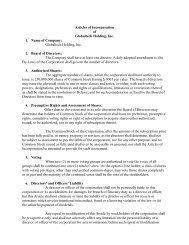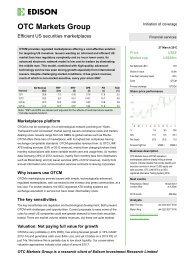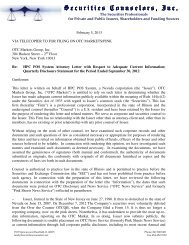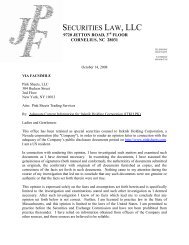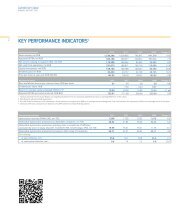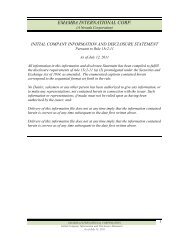2011 Annual Report - OTCIQ.com
2011 Annual Report - OTCIQ.com
2011 Annual Report - OTCIQ.com
You also want an ePaper? Increase the reach of your titles
YUMPU automatically turns print PDFs into web optimized ePapers that Google loves.
Strategic Risks<br />
Our business strategy involves acquisitions and investments<br />
in our core business as well as disposals. This strategy depends<br />
in part on our ability to successfully identify, acquire, and<br />
integrate <strong>com</strong>panies that enhance, on acceptable terms, our<br />
energy business. In order to obtain the necessary approvals<br />
for acquisitions, we may be required to divest other parts of<br />
our business or to make concessions or undertakings that<br />
materially affect our business. In addition, there can be no<br />
assurance that we will be able to achieve the returns we<br />
expect from any acquisition or investment. For example, we<br />
may fail to retain key employees; may be unable to successfully<br />
integrate new businesses with our existing businesses;<br />
may incorrectly judge expected cost savings, operating profits,<br />
or future market trends and regulatory changes; or may spend<br />
more on the acquisition, integration, and operation of new<br />
businesses than anticipated. Furthermore, investments and<br />
acquisitions in new geographic areas or lines of business require<br />
us to be<strong>com</strong>e familiar with new sales markets and <strong>com</strong>petitors<br />
and expose us to <strong>com</strong>mercial and other risks.<br />
We have <strong>com</strong>prehensive processes in place to manage potential<br />
risks relating to acquisitions and investments. These<br />
processes include, in addition to the relevant <strong>com</strong>pany guidelines<br />
and manuals, <strong>com</strong>prehensive due diligence, legally<br />
binding contracts, a multi-stage approvals process, and shareholding<br />
and project controlling. Comprehensive post-acquisition<br />
integration projects also contribute to successful integration.<br />
In the case of planned disposals, E.ON faces the risk, which is<br />
not assessable, of disposals not taking place or being delayed<br />
and the risk that E.ON receives lower-than-anticipated disposal<br />
proceeds. In such projects, it is not possible to determine<br />
the likelihood of these risks. If planned disposals do not take<br />
place or are significantly delayed, this would have a negative<br />
impact on the planned development of our debt factor.<br />
CEO Letter<br />
E.ON Stock<br />
Combined Group Management <strong>Report</strong><br />
Consolidated Financial Statements<br />
Corporate Governance <strong>Report</strong><br />
Supervisory Board and Board of Management<br />
Tables and Explanations<br />
Operational and Environmental Risks<br />
Technologically <strong>com</strong>plex production facilities are used in the<br />
production and distribution of energy. Germany’s Renewable<br />
Energy Law and the transformation of the country’s energy<br />
system are resulting in an increase in decentralized feed-in,<br />
which creates the need for additional expansion of the distribution<br />
network. On a regional level, the increase in decentralized<br />
feed-in (primarily from renewables) has led to a shift<br />
in load flows. In Germany, where power plants are located in<br />
closer proximity to population centers than in many other<br />
countries, the risk of blackouts is lower due to shorter transmission<br />
paths and a strongly meshed network. Nevertheless,<br />
our operations in and outside Germany could experience unanticipated<br />
operational or other problems leading to a power<br />
failure or shutdown. Operational failures or extended production<br />
stoppages of facilities or <strong>com</strong>ponents of facilities, including<br />
new-build projects, could negatively impact our earnings.<br />
We could also be subject to environmental liabilities associated<br />
with our power generation operations that could materially<br />
and adversely affect our business. In addition, new or amended<br />
environmental laws and regulations may result in material<br />
increases in our costs.<br />
Climate change has be<strong>com</strong>e a central risk factor. For example,<br />
E.ON’s operations could be adversely affected by the absence<br />
of precipitation or above-average temperatures that reduce the<br />
cooling efficiency of our generation assets and may make it<br />
necessary to shut them down. Extreme weather or long-term<br />
climatic change could also affect wind power generation.<br />
Alongside risks to our energy production, there are also risks<br />
53



